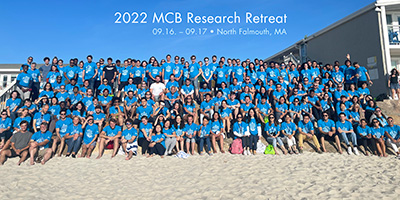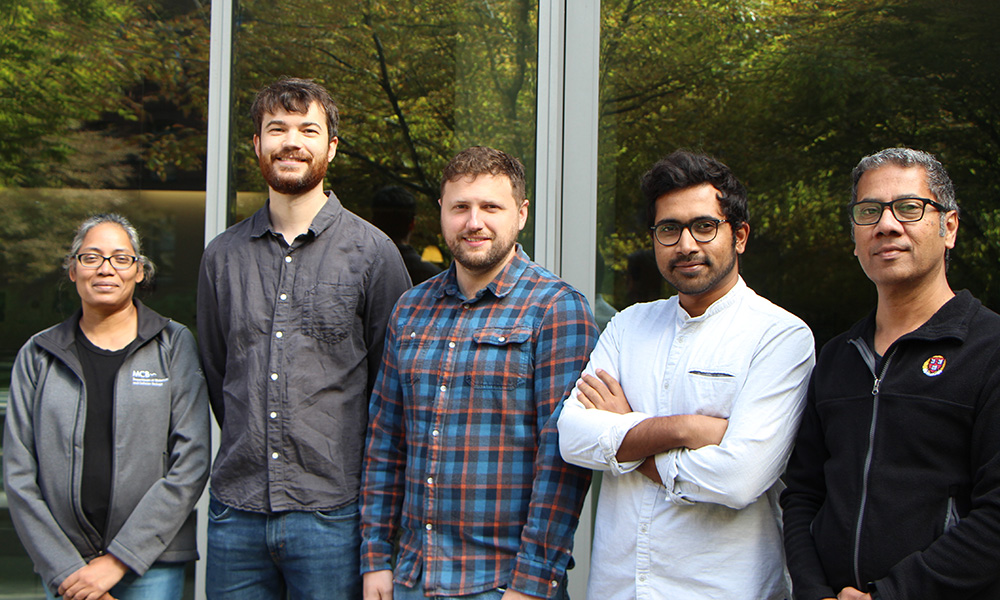The annual MCB Research Retreat includes an award ceremony, celebrating people across the department.
This year marked the inaugural instantiation of the MCB Mentorship Award, which went to two recipients: postdoc Corey Allard of the Bellono Lab and MCB faculty Venki Murthy.
“The mentorship award is the brainchild of MCB’s community task force on Diversity, Inclusion and Belonging,” says graduate student Kumaresh Krishnan of the Engert Lab, who served on the community task force and presented the award to Murthy at the ceremony. “The goal is to acknowledge impactful mentors in our community and inspire everyone to continue cultivating this climate here at MCB. We are delighted to have Corey and Venki as the first recipients of this award. Their stellar mentorship is sure to inspire others in the community.”
In previously established award categories, MCB faculty Victoria D’Souza garnered the Doty-Losick Award for Exceptional Service, the Meselson Prize for Most Beautiful Experiment went to postdoc Malcolm Campbell of the Uchida Lab, and postdoc Suhrid Gosh of the Extavour Lab won the Peralta Science Essay Award.
Thank you to everyone who joined us at the retreat, and congratulations to all of the award recipients! To find out more about the award winners’ accomplishments, keep reading.
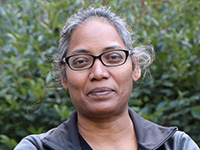
Victoria D’Souza
Doty-Losick Prize for Exceptional Service
The Doty-Losick Award, named after MCB faculty Paul Doty (1920-2011) and Richard Losick, honors MCB community members who go above and beyond in their contributions to departmental committees and initiatives.
MCB faculty Victoria D’Souza received this award in recognition of her leadership as Co-Director of the MCO Graduate Program and in the most recent faculty search, which recruited Ryan Nett and Jeeyun Chung to join the department. MCB faculty Rachelle Gaudet presented the award to D’Souza at the Retreat Awards ceremony.
“This award means so much to me,” D’Souza says. “Rich Losick’s exceptional service to the department, the university, and the students he mentors have always been an inspiration. He played such a big part in recruiting me to the department. Faculty searches are incredibly important— they not only identify our future colleagues but also determine the course of the future of the department itself. I am grateful that I got a chance to do my part to grow our department.”
Nominators cited D’Souza’s dedication and effectiveness as a leader in the department. “Victoria D’Souza is an outstanding choice for the Doty Prize,” one nominator wrote. “She has devoted herself wholeheartedly to the Department, having made exceptional contributions in two separate and important areas. Under her leadership, the Junior Faculty Search Committee succeeded both in identifying and then successfully recruiting two excellent candidates who are now joining our community. But that is not all. She helped lead the Molecules, Cells and Organisms graduate program, which serves MCB as well as our sister Departments of OEB and SCRB and which represents a major responsibility. Victoria is a role model for a dedicated member of the MCB community.”
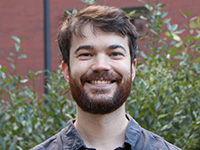
Meselson Award for Most Beautiful Experiment
The Meselson Award for Most Beautiful Experiment celebrates elegant and insightful experiments that continue in the tradition of the famous 1950s experiment where MCB professor Matthew Meselson and his colleague Franklin Stahl were able to demonstrate the semi-conservative nature of DNA.
This year’s Meselson Award winner is postdoc Malcolm Campbell of the Uchida Lab, who led a series of experiments exploring dopamine neurons’ role in learning and error prediction.
“I would like to thank my mentor Naoshige Uchida,” Campbell says. “It was his style of elegant experimental design which drew me to his lab in the first place. I really enjoy the aesthetic quality of a well-designed experiment, so it’s nice to be specifically recognized for that quality in my own work.”
Campbell’s experiment combined techniques in optogenetics and electrophysiological recording to investigate how certain dopamine neurons’ activity shapes learning. These techniques allowed Campbell and his colleagues to simultaneously trigger the dopamine neurons and record the neurons’ activity during a learning task.
“It was crucial to be able to specifically target subsets of dopamine neurons, so that we could measure the impact of dopamine release on the very same cells that released it, versus other dopamine neurons that were not involved,” Campbell explains. “This let us pinpoint which subsets of dopamine neurons were critically involved in learning and how this learning spreads from its initial source to other neurons in the brain.”
Their results indicated that the brain uses an algorithm very similar to the “actor-critic model” used in machine learning, where the actor makes a decision and the critic evaluates the action and decides whether to adjust future behavior.
Nominators praised Campbell’s experimental design and technical sophistication, as well as his effectiveness in leading the project and generating results. “Malcolm cleverly designed a multi-pronged approach to tackle this issue: he first designed an experimental paradigm that enabled him to distinguish as well as artificially activate different subpopulations of dopaminergic neurons based on their downstream projection areas,” one nominator wrote. “Second, he recorded the activity of large populations of dopaminergic neurons using state-of-the-art Neuropixels electrodes, which enable to simultaneously monitor over 300 units during an odor learning task, while keeping the ability to identify distinct populations thanks to the first feature. This ingenious paradigm worked beautifully as it enabled Malcolm to demonstrate how dopaminergic neurons projecting to different brain areas learned together and thus collaborate in a task, although only a specific subset of dopaminergic neurons is stimulated.”
“Despite the great advance in modern tools in neurobiology, our understanding of how the brain works remains very limited,” another nominator added. “One challenge is to put different types of information–connectivity, single neuron properties, activity of single neurons–into a behavioral context. Malcolm’s work elegantly advances our ability to connect different types of information in behaving animals–a greatly sought and needed improvement in neuroscience.”
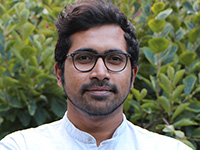
Named for MCB faculty Ernest Peralta (1959-1999), this award recognizes MCB researchers who write essays explaining their research for a lay audience. This year’s Peralta Award went to postdoc Suhrid Ghosh of the Extavour Lab for his essay titled “Same, same but different: how does plasticity appear (and disappear) during animal development?”
“I am elated to be recognized by this wonderful group of people!” Ghosh says. “I love the feeling of being able to communicate my science and get others interested in it.”
Ghosh begins the essay by describing his roommate’s tribulations in trying to replicate a family recipe and uses the analogy of a recipe to describe how developmental plasticity yields different results despite starting from the same DNA recipe.
In the essay, Ghosh writes,“The genetic material (read: recipe) in a fertilized egg contains all the necessary information to generate an adult. Specific proteins are produced in a chronological manner, which perform their tasks with precision(like my flat mate). However, a good amount of variability is introduced by the ‘environment’-think cookware, make of your oven, hardness of water and freshness of your veggies. For a developing organism, the environment entails extrinsic factors like temperature, humidity, nutritional quality, light, etc.Complex interactions between genes and environment determine the outcome of animal development in terms of appearance, behavior, and physiology. Another contributing factor is ‘noise’, a product of little transgressions of thousands of molecules controlling the chemical reactions driving development.”
He goes on to describe his Ph.D. research where he found glucagon-producing cells in fly larvae that were unexpectedly loaded with insulin. Since glucagon is a hallmark of starvation and insulin is produced after eating, the presence of the two molecules seemed contradictory. Ghosh found these cells were storing these molecules in an insulin reservoir, which can help regulate later development and metamorphosis.
Reflecting on his writing process, Ghosh adds,“Working at the intersection of cell and developmental biology and spending a lot of time in nature inspired me to revisit this age-old topic. I guess I have been analogizing a lot lately and wanted to write them down.”
Ghosh will continue to explore developmental plasticity through research in the Extavour Lab.
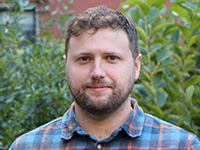
Corey Allard
Mentorship Award
Postdoc Corey Allard of the Bellono Lab is one of the inaugural recipients of the Mentorship Award, which honors mentors who go above and beyond in offering support to trainees.
“Corey Allard is the exactly right person to receive the inaugural MCB mentorship award,” MCB faculty Nicholas Bellono wrote in a recommendation letter. “He has real grounds to stand on as a model mentor who prioritizes our job in making discoveries, doing rigorous science, and exciting the community with new work. Beyond this, he takes so much of his time (I don’t know where it comes from) to be generous in helping the community, trainees within the lab, and students in the classroom.” Bellono cited Allard’s efforts in TAing hybrid class sessions, mentoring four different summer students, participating in community-building activities, and working with graduate students.
“Corey is highly deserving of this award,” Bellono added. “He exemplifies what MCB strives to be in embodying scientific rigor, excitement, positive intensity, and teaching and mentorship and should continually be recognized as a model citizen in the MCB and broader scientific community. Most importantly, he encourages students to be positive, excited, and fearless in their science which impacts how they address other facets of their life including career development, work-life balance, and assuming leadership roles.”
Allard says that he’s been fortunate to find excellent mentors throughout his career and that he sees his own mentorship efforts as a way to “pay it forward.” He adds that working with his mentees is one of his favorite aspects of being in academia.
“For me, mentorship is about recognizing someone’s potential, and helping them reach it,” Allard says. “I think my approach to mentoring scientists is to ask them a lot of questions and try to understand their experience. What they enjoy and what they don’t, what is hard and what is easy, and where they could use some guidance and where they just need some space to figure it out. I think the other important thing is to be deliberate about including people wherever possible and helping to find new opportunities for them. Mentorship is about encouraging growth.”
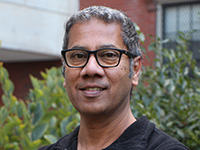
Mentorship Award
The selection committee also chose to recognize MCB faculty Venkatesh Murthy through the inaugural Mentorship Award.
Murthy’s trainees speak glowingly of his mentorship abilities and the culture he fosters in his lab. “I cannot describe the gratitude I have for Venki as a mentor,” one anonymous graduate student wrote in a nomination letter. “In all our conversations, I feel like Venki has allowed me to go at my own pace, whether that be taking my time or full speed ahead on a project. I came into the lab after a very emotionally difficult time in my life, and the environment Venki has created allowed me to feel safe, supported, and motivated to do science.”
Another anonymous graduate student wrote, “You treat everyone with genuine respect—students, postdocs, staff, faculties and cleaning ladies. You understand and are kind to the different characteristics of different people.You are impressively knowledgeable but humble.You are passionate about science, jazz, and life, but not fame or titles…You are shockingly altruistic…We secretly address you as a philanthropist, who writes MATLAB codes himself to wrap up unfinished project and who has accepted multiple science refugees. It is amazing that you place people higher than science. This is a powerful belief, and I believe it has influenced the life of everyone in the lab profoundly.”
At the retreat awards ceremony, Murthy expressed gratitude to the community but said that the focus should be on younger trainees. “I am humbled by this award, especially since the nomination came from trainees–many thanks to them,” says Murthy. “I am very lucky to have smart, creative and considerate people in my group. I also want to take this chance to give a shout-out to the many wonderful mentors in the MCB community, who are not always recognized.”
by Diana Crow


